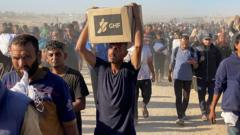Recent reports from Gaza have brought to light alarming incidents where Israeli military forces opened fire on Palestinians seeking food aid, leading to a tragic loss of civilian lives. Witnesses described horrific scenes, with one foreign observer labeling the situation as “total carnage.” In stark contrast, the Israeli military claims that troops responded to "suspects" deviating from designated routes with warning shots that escalated under perceived threat.
The violent confrontation at the newly established aid distribution sites, designed primarily to provide humanitarian assistance amid a dire crisis, has fueled an already heated debate over Israel's controversial humanitarian strategy. The initiative, largely backed by the United States and conceived amid a complete ban on aid shipments into Gaza, aims to replace traditional aid operations that were managed by the United Nations and other established international charities.
The Gaza Humanitarian Foundation (GHF), a private entity charged with coordinating aid distribution, has faced intense scrutiny. With armed personnel overseeing aid distribution, the system has been criticized for fundamentally failing to meet the principles of humanity and impartiality. The resignation of GHF head Jake Wood just over a week ago underscored these concerns, as he expressed doubt over the organization’s ability to operate ethically.
In a dramatic shift in operations, the GHF has replaced a comprehensive UN network that previously provided essential resources, such as communal kitchens serving hundreds of thousands. The newly instituted system, however, has devolved into chaos, forcing vulnerable civilians to navigate dangerous conditions in search of limited aid. Reports indicate that the disorganized nature of distributions has led to desperate crowds where the strongest individuals often take more aid than needed, leaving the most vulnerable without any support.
The UN High Commissioner for Human Rights, Volker Türk, publicly criticized the GHF operation as showing "utter disregard for civilians." He questioned the morality of placing those in dire need in positions where their safety is jeopardized. Israeli policy has come under further scrutiny, as ministers have suggested using food and humanitarian aid strategically against groups like Hamas.
Amid the turmoil and rising international outrage, allies of Israel, including the UK, France, and Canada, are escalating calls for urgent reforms in Israeli practices. They insist that the ongoing humanitarian assistance must be restructured to stabilize the situation for over two million Palestinians affected by the crisis, putting Israel’s diplomatic relations increasingly at risk as its global isolation deepens.











